Related Research Articles

Anzac Day is a national day of remembrance in Australia and New Zealand that broadly commemorates all Australians and New Zealanders "who served and died in all wars, conflicts, and peacekeeping operations" and "the contribution and suffering of all those who have served". Observed on 25 April each year, Anzac Day was originally devised to honour the members of the Australian and New Zealand Army Corps (ANZAC) who served in the Gallipoli campaign, their first engagement in the First World War (1914–1918).

Remembrance Day is a memorial day observed in Commonwealth member states since the end of the First World War to honour armed forces members who have died in the line of duty. The day is also marked by war remembrances in several other non-Commonwealth countries. In most countries, Remembrance Day is observed on 11 November to recall the end of First World War hostilities. Hostilities ended "at the 11th hour of the 11th day of the 11th month" of 1918, in accordance with the armistice signed by representatives of Germany and the Entente between 5:12 and 5:20 that morning. The First World War formally ended with the signing of the Treaty of Versailles on 28 June 1919.
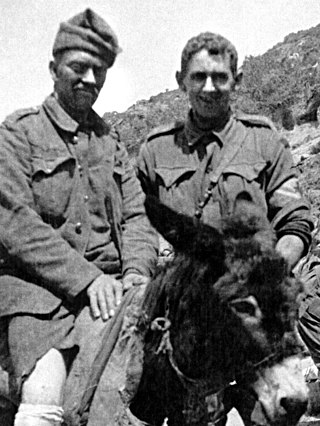
John Kirkpatrick, commonly known as John Simpson, was a stretcher bearer with the 3rd Australian Field Ambulance during the Gallipoli campaign – the Allied attempt to capture Constantinople, capital of the Ottoman Empire, during the First World War.
To be mentioned in dispatches describes a member of the armed forces whose name appears in an official report written by a superior officer and sent to the high command, in which their gallant or meritorious action in the face of the enemy is described.
The Ceylon Defence Force (CDF) was established in 1910 by the Ceylonese legislation Ceylon Defence Force Ordinance, which reformed the Ceylon Volunteer Force (CVF) that existed previously as the military reserve in the British Crown colony of Ceylon. At the time of forming it was only a reserve force but soon developed into a regular force responsible for the defence of Ceylon. The CDF was under the command of the General Officer Commanding, Ceylon of the British Army in Ceylon if mobilised. However mobilisation could be carried out only under orders from the Governor.

Richard Charles Travis, was a New Zealand soldier who fought during the First World War and was posthumously decorated with the Victoria Cross (VC), the highest award for gallantry in the face of the enemy that can be awarded to Commonwealth forces.
Alexander William Campbell was the final surviving Australian participant of the Gallipoli campaign during the First World War. Campbell joined the Australian Army at the age of 16 in 1915, and served as a stores carrier for two months during the fighting at Gallipoli. He was invalided home and discharged in 1916. He later worked in large number of roles, was twice married and had nine children. He is the great-grandfather of actress, singer and model Ruby Rose.
Victor Manson Spencer was a volunteer from Invercargill, New Zealand who fought in the Otago Infantry Regiment of the New Zealand Division in World War I. Spencer was executed for desertion on 24 February 1918, despite later suggestions that he was severely traumatised by shellshock, having fought and survived several campaigns.
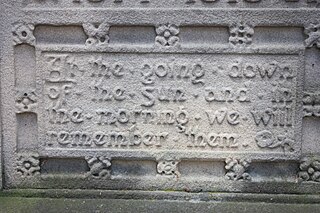
"For the Fallen" is a poem written by Laurence Binyon. It was first published in The Times in September 1914. It was also published in Binyon's book "The Winnowing Fan : Poems On The Great War" by Elkin Mathews, London, 1914.
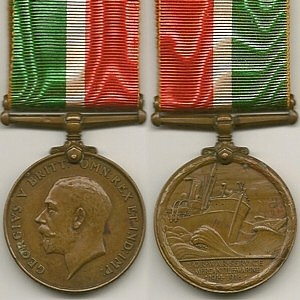
The Mercantile Marine War Medal was established in 1919 and awarded by the Board of Trade of the United Kingdom to mariners of the British Mercantile Marine for service at sea during the First World War.

James Charles Martin was the youngest Australian known to have died in World War I. He was only 14 years and nine months old when he succumbed to typhoid during the Gallipoli campaign. He was one of 20 Australian soldiers under the age of 18 known to have died in World War I.

The military history of New Zealand during World War I began in August 1914. When Britain declared war on Germany at the start of the First World War, the New Zealand Government followed without hesitation, despite its geographic isolation and small population. It was believed at the time that any declaration of war by the United Kingdom automatically included New Zealand; and the Governor announced that New Zealand was at war with Germany from the steps of Parliament on 5 August.
Walter Parker was an Australian soldier and the third last surviving veteran of the Australian and New Zealand Army Corps (ANZAC) who served in World War I.
Roy Longmore was an Australian soldier and centenarian, who after Alec Campbell, was noted as the second last living Australian and New Zealand Army Corps (ANZAC) veteran who saw service in World War I.

The Saint Helena Medal was the first French campaign medal. It was established in 1857 by a decree of emperor Napoleon III to recognise participation in the campaigns led by emperor Napoleon I.
John Braithwaite was a New Zealander who served in the First World War with the New Zealand Expeditionary Force. Supposedly a journalist before the war, in 1916 he was convicted of mutiny and executed by firing squad. He was posthumously pardoned in September 2000 through the passage of the Pardon for Soldiers of the Great War Act 2000.
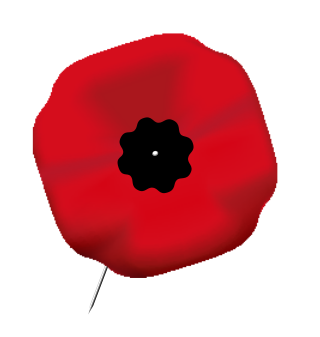
The First World War centenary was the four-year period marking the centenary of the First World War, which began on 28 July 2014 with a series of commemorations of the outbreak of the war organised across the continent of Europe, and ended with the centenary of the 1918 Armistice on 11 November 2018.
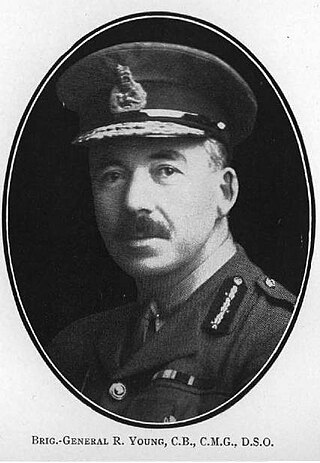
Major General Robert Young, was a dentist, volunteer soldier, World War I brigade commander and professional soldier in the New Zealand Military Forces.

Herbert Francis Burden was a soldier in the British Expeditionary Force during the First World War. Born in 1898 in Lewisham, south-east London, Burden is generally accepted as having lied about his age in order to enlist at the age of 16. Having joined the 1st South Northumberland Fusiliers, he soon deserted, returned to London and joined the East Surrey Regiment, whom he also soon deserted. Rejoining his old battalion, he was sent to France when the army believed him to be 19 years old, and he probably fought at the Battle of Bellewaarde Ridge in May 1915. Having already gone absent without leave (AWOL) from his unit on multiple occasions, he left his post once again the following month—he said to see a friend in the neighbouring regiment—but he was arrested and accused of desertion. Found guilty, he was executed by firing squad two days later aged 17. In 2001 his case, and his image, was the basis for a memorial statue in the National Memorial Arboretum to those who had been unfairly executed by 20th-century standards. Five years later, Burden and the other men were granted pardons by the British government.

HMAS Sydney I – SMS Emden Memorial is a heritage-listed former foreign naval ship gun and now war memorial and war trophy located in Hyde Park, on the corner of Liverpool and College Streets in the Sydney central business district, in the City of Sydney local government area of New South Wales, Australia. It was designed by City of Sydney and built from 1917 by Messrs Loveridge and Hudson, Redfern. It is also known as HMAS Sydney 1 - SMS Emden Memorial and Emden Gun. The property is owned by City of Sydney. It was added to the New South Wales State Heritage Register on 27 February 2015.
References
- ↑ "Pardon for Soldiers of the Great War Act 2000 No 29 (as at 15 September 2000), Public Act – New Zealand Legislation".
- ↑ "Moments of truth from World War I - New Zealand Listener". 22 April 2016.
- ↑ Lockley, Mike (17 January 2016). "World War 1 soldier executed for mutiny to be honoured at National Memorial Arboretum".
- ↑ "World War One pardoned soldiers to be recognised with awards".
- ↑ Devlin, Kimberley Crayton-Brown and Collette (19 November 2012). "Pardoned deserter's medals on show" – via Stuff.co.nz.
- ↑ "Pardon for Soldiers of the Great War Bill". Parliamentary Debates (Hansard) . Vol. 587. Parliament of New Zealand: House of Representatives. 12 September 2000.
- ↑ "WWI Pardoned Soldiers To Be Recognised With Awards". Scoop Parliament. Scoop Media. 11 July 2005. Retrieved 28 March 2018.